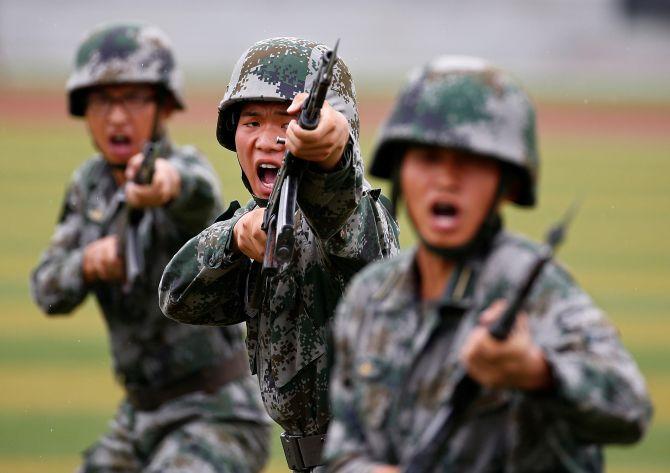'There is no Buddha or Gandhi among countries, existing for the service of others; they all exist for the good of themselves.'
'For each country, its own interests should be paramount, and it is futile and churlish to expect China to be an exception to this rule,' says B S Raghavan, the distinguished civil servant and long-time China-watcher.

People's Liberation Army soldiers at a drill in Beijing. Photograph: Peter Kujundzic/Reuters
Ever since China rediscovered itself after the first few decades of tottering during the Great Helmsman's regime and began reaping the abundant benefits of 'market socialism', taking its place alongside the world's most advanced economies, it has rolled out a series of innovative blockbusters in the domain of foreign policy.
Some worrisome as its stick-in-the-mud postures in the South China Sea and puffing up Pakistan as an all-weather friend, but some capable of catapulting it as a possible replacement of the United States in the world calculus.
Among the earliest enterprises with which it captured the world's attention and caused a flutter among countries on the Indian Ocean Rim was the so-called 'string of pearls' signifying a network of Chinese military and commercial facilities along Pakistan, Sri Lanka, Bangladesh, Maldives and Somalia overseeing the sea-lanes of communication extending from the Chinese mainland to Port Sudan.
Nobody can precisely pin-point the origin of this pretentious appellation, but China regards the 'pearls' as central to maintaining and safeguarding its maritime and energy security, since they run through several major choke points such as the Straits of Mandeb, Malacca, Hormuz and Lombok.
The commentariat in India has been in a tizzy about this, fearing inroads into its own maritime and naval power status.
But China has firmly disavowed any interests in developing these relationships other than the strictly limited ones of protecting its energy flank, and possibly exploring some mutually beneficial avenues of commercial cooperation.
As of now, think-tanks and observers in advanced industrial countries have not come across any indications of objectionable Chinese designs associated with the 'string'.
China watchers in India are also agog over Chinese involvement in the building of the port complexes at Hambantota in Sri Lanka and Gwadar in Pakistan, and what China's People's Liberation Army (PLA) claims to be a logistics support base in Djibouti.
They are raising a lot of concerns about them, as also about the recent free trade agreement and maritime trade plans with the Maldives.
They are propagating the view that these are outwardly sugar-coated deals whose ultimate side-effects will be nothing short of venomous, resulting in financial ruin of the respective countries and China's domination of most aspects of their national life -- in short, an updated version of old-time imperialism.
The latest Chinese concoction that has let a cat among the pigeons is what originally had the euphoniously euphoric title of One-Belt-One-Road, now modestly renamed as the Belt-and-Road Initiative, BRI.
An article, 'China's Belt and Road Gamble: Can it deliver?' in the January 8, 2018 issue of the Johns Hopkins University-based School of Advanced International Studies Review of International Affairs gives the contours of the BRI thus:
'The BRI envisages a Silk Road Belt through Central Asia and extending beyond to West Asia, the Middle East terminating in Europe with a spur extending into South and Southeast Asia; and a Maritime Silk Road that could more closely knit together economies in Southeast Asia, Oceania and East Africa.'
'The Belt is comprised of 6 corridors: China-Mongolia-Russia; a new Eurasian Land Bridge; a corridor from China to Central and Western Asia; a China-Indo-China peninsula corridor; a China Pakistan corridor; and a Bangladesh-Myanmar-China corridor.'
'The Maritime Silk Road to develop the 'blue engine' (lanse yinqing) initially identified two routes: One that traverses the Indian Ocean and terminates in the Mediterranean; and a second that penetrates the South Pacific.'
'To these China has added a 'blue economic passage' (lanse jingji tongdao), the Northern route now that the lower reaches of the Arctic Ocean are expected to be ice-free for much of the year by 2030 and usable by ice strengthened ships.'
'The BRI could include as many as 65 countries, 40 of which have signed cooperation agreements with China. BRI could ultimately impact 4.4 billion people with a collective GDP of $21 trillion -- almost one fourth of the global total.'
As regards its financial implications and possible sources of funding, the same article visualises the BRI's 'financial lynchpins' thus far as: The Asian Infrastructure Investment Bank (with $100 billion of capital); the $40 billion Silk Road Fund; the New Development Bank (or BRICS Bank, with an initial subscribed capital of $50 billion); China's policy banks: ExIm and the China Development Bank; and the leading Chinese commercial banks.
At a major BRI event held on May 2017 in Beijing, President Xi Jinping announced that China would commit another $100 billion towards its implementation in addition to the $50 billion spent over the past four years.
If the currently projected spending is realised, the BRI would be 12 to 15 times the size of the Marshall Plan.
At the May 2017 BRI event, Xi christened it the 'project of the century' which, from the look of it, is a giant leap forward taken by China to stamp its indelible presence and unchallengeable authority on the 21st century and beyond.
The SAIS Review, however, takes a sombre view of the economics of the initiative particularly with reference to the return on investment and its opportunity cost, the adequacy of the vetting of the projects under implementation and on the drawing board, the nature and cost of complementary investments needed for the realisation of the benefits of the main projects, and the awareness of the beneficiary countries of what they are letting themselves in for if the returns fall short of expectations.
Writings on China are generally loaded with scepticism and suspicion about its aims and intentions in whatever it announces or undertakes. Nothing is taken as altruistic and everything is taken to spring from ulterior motives.
What those indulging in jeremiads about China forget is that there is no country in the world that can be said to be different from China.
There is no Gautam Buddha or Mahatma Gandhi or Mother Teresa among countries, existing for the service of others; they all exist for the good of themselves.
It stands to reason that for each country, its own interests should be paramount, and it is futile and churlish to expect China to be an exception to this rule.
When the US poured billions of dollars in the Marshal Plan or food aid under public law 480 or grants to bolster other countries' resource base or economies or military strength, it did so pursuant to its own agenda.
The chief elements of that agenda were to draw those countries within its fold, to secure their unquestioned acceptance of its domestic and foreign policies and to condition them to act as per its advice even on matters pertaining to their internal affairs, in short, to buy them out.
These were its own 'strings' attached to what seemed its munificence on the surface.
India too uses time-honoured modalities of food aid, technical assistance, financial grants and offers for construction of projects at its cost or on concessional terms with broadly the same objective of broadening, deepening and buttressing its influence and reach.
It is sanctimonious, therefore, to pick on China if it follows the same course and acts no differently.
So long as its outreach programmes do not harm, or are not targeted against, the interests and come in the way of freedom of action of other countries, the only mature, sober and balanced response is to accept them as facts of life and see if they can be trumped by initiatives of one's own.
Double standards in judging China is also due to the fossilised mindset and the consequential inability of most governments and analysts, as far as international relations are concerned, to shed outdated shibboleths such as 'balance of power', 'containment', 'encirclement', 'spheres of influence', 'deterrence', 'pre-emptive strike', 'realpolitik' and the like.
Nothing in today's fast-moving world is either-or, black or white, or zero-sum.
In this scenario, there is room for every country to realise its maximum potential, without having to practise one-upmanship or getting in each other's way.
B S Raghavan is a former member of the Indian Administrative Service who handled security issues during the Chinese invasion of 1962 and India-Pakistan War of 1965 as Director, Political and Security Policy Planning and Member of the Joint Intelligence Committee.
He is currently the Patron of the Chennai Centre for China Studies. The views expressed are his own.










